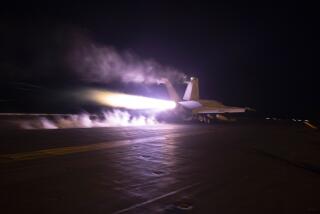U.S. tightens cargo restrictions after bomb attempt
- Share via
Reporting from Washington — Trying to seal security gaps exposed by the Yemen bomb plot, the U.S. on Monday expanded a ban on air cargo from Yemen to include Somalia, and announced that printer cartridges weighing more than 16 ounces would not be allowed on domestic and U.S.-bound passenger flights.
U.S. officials have scrambled to tighten the international air cargo system in the two weeks since a Saudi intelligence tip enabled authorities to intercept two U.S.-bound packages from Yemen, both containing large printer cartridges packed with explosive powder that were intended to explode during flight. One of the packages, discovered in Dubai, had flown on two passenger airliners before it was found.
Homeland Security Secretary Janet Napolitano announced the new rules, which went into effect as a team of Transportation Security Administration inspection specialists was in Yemen conducting training and providing equipment to increase the scrutiny given to packages once the U.S. resumes accepting shipments from there.
As part of stepped-up cargo screening, the Homeland Security Department is asking shipping companies to provide sender and destination data on cargo shipments to the department sooner than the current requirement of four hours before landing on U.S. soil. That information, combined with terrorism tracking data stored in the Homeland-Security-led National Targeting Center, could help identify packages that intelligence shows are “high risk” before they are loaded onto planes.
Under the current cargo protocols, high-risk packages may already be in the air bound for a U.S. airport before they are tagged for extra screening.
The makers of the cargo bomb packages intercepted last month attempted to hide more than 10 ounces of the powdered explosive PETN inside printer cartridges. PETN, which can be produced in a rudimentary lab or collected from munitions, looks like fine popcorn salt and has nearly the same consistency as powdered toner. Bomb experts said the amount of PETN found in the bombs would have produced a blast strong enough to bring down an airliner.
Most ink cartridges weigh less than 16 ounces, so banning large toner cartridges isn’t expected to affect the vast majority of fliers.
The ban will help reduce the risk of a bomb hidden in a printer cartridge being smuggled onto a plane, said Dave Williams, a retired FBI bomb expert. “In my experience, these knuckleheads don’t just make a couple of these devices, they make a whole shelf of them,” Williams said.
“But it is only a solution in the near term,” said Rick Nelson, director of the domestic security and counter-terrorism program at the Center for Strategic and International Studies. “We are facing a creative and adaptive enemy.”
The number of air cargo packages typically headed to the U.S. each day from Yemen and Somalia can be counted in the tens, a Homeland Security official said, so the effect of the shutdown is small.
The Homeland Security Department decided to ground air cargo from Somalia because of the country’s proximity to Yemen — just across the 100-mile-wide Gulf of Aden — and because it is home to Al Shabab, a militant organization with ties to Al Qaeda, said a senior administration official who spoke on condition of anonymity because of the sensitive nature of the intelligence.
The halt was not based on specific intelligence about bomb packages in Somalia, the official said.
More to Read
Sign up for Essential California
The most important California stories and recommendations in your inbox every morning.
You may occasionally receive promotional content from the Los Angeles Times.













